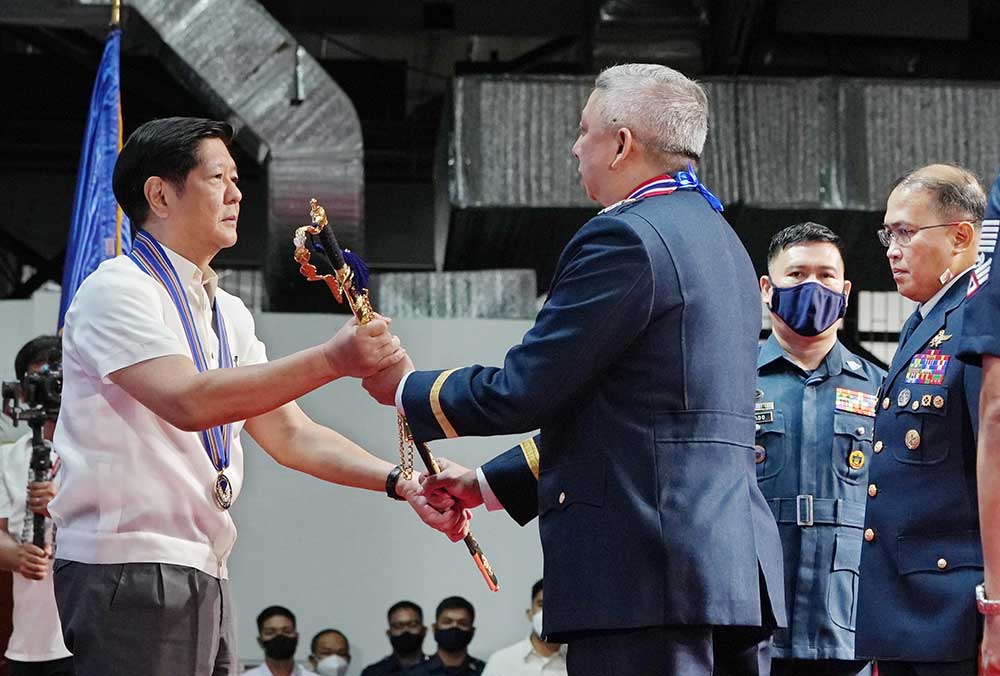Backs PH amid ‘swarming’ of Chinese ships
THE United States yesterday expressed support for the Philippines and urged China to respect international law amid reports of Chinese vessels swarming near the Iroquois Reef and Sabina Shoal in the West Philippine Sea (WPS).
Iroquois Reef and Sabina Shoal are inside the Philippines’ 200-nautical mile exclusive economic zone.
The Asia Maritime Transparency Initiative last month reported the presence of Chinese militia vessels in “militia hot spots” in the West Philippine Sea in the South China Sea, including Iroquois Reef Iroquois which is127 nautical miles from Palawan and which US Vice President Kamala Harris visited last month to reiterate Washington’s defense commitments to Manila.
Vice Adm. Alberto Carlos, chief of the military’s Western Command, last week said the Chinese ships have been in the areas since early this year.
US Department of State spokesperson Ned Price, said in a statement released yesterday by the US Embassy in Manila, said: “The United States supports the Philippines’ continued calls upon the People’s Republic of China (PRC) to respect the international law of the sea in the South China Sea, as reflected in the UN (United Nations) Convention on the Law of the Sea, and its legal obligations pursuant to the 2016 arbitral ruling.”
“The reported escalating swarms of PRC vessels in the vicinity of Iroquois Reef and Sabina Shoal in the Spratly Islands interfere with the livelihoods of Philippine fishing communities, and also reflect continuing disregard for other South China Sea claimants and states lawfully operating in the region,” he added.
The Chinese Embassy in the Philippines said Price’s statement “contains unfounded accusations against China that attempt to stir up troubles and drive a wedge between China and the Philippines.”
“Over the past few years, with the joint efforts of all parties concerned, the South China Sea situation has maintained overall stability. Separated by only a strip of water, China and the Philippines belong to the Asian family and have stayed friendly for thousands of years.
It is only natural for neighbors to have differences. The two countries share the Asian wisdom of settling differences through dialogue and consultation,” said Chinese Embassy spokesperson in a statement.
The Department of Foreign Affairs has yet to announce it it will file a diplomatic protest with China over the swarming incidents.
Price said Washington shares Manila’s concerns on the “unsafe encounter” between the Chinese Coast Guard and the Philippine Navy in the South China Sea, where debris believed to be from a Chinese rocket was reported to have been “rudely” taken by Beijing’s forces.
The DFA initially filed a note verbale with China seeking clarification from Beijing about the incident after the Chinese Coast Guard was said to have “forcefully” taken an unidentified floating object, believed to be rocket debris, recovered by Filipino troops near Pag-asa island in the West Philippine Sea. It was upgraded to a diplomatic protest on December 12.
The Chinese Embassy in Manila denied the Armed Forces’ report, saying there was no confrontation and the debris was recovered after “friendly consultation.”
Amid these incidents, Price reiterated Washington’s support to Manila.
“The United States stands with our ally, the Philippines, in upholding the rules-based international order and freedom of navigation in the South China Sea as guaranteed under international law,” he added.
China claims almost the entire South China Sea while the Philippines, Vietnam, Taiwan, Brunei, and Malaysia have overlapping claims.
In 2016, the Netherlands-based Permanent Court of Arbitration declared as invalid China’s sweeping claims in the South China Sea under its so-called nine dash line in a historic case brought by the Philippines.
Beijing refused to acknowledge the arbitral ruling.
‘PROPER PLACE’
The Chinese Embassy said under the “strategic guidance” of Chinese and Philippine heads of state, the two countries “have agreed to place South China Sea disputes at a proper place in the bilateral relations and manage them properly through dialogue and consultation.”
“That said, as the Chinese proverb goes, `the sea desires calmness but the waves keep rolling.’ The US keeps meddling in the South China Sea disputes and trying to drive wedges between countries in the region, creating tensions and harming regional peace and stability. What the US has done is not to help anyone but to serve its own geopolitical interests,” it said.
“China’s stand on the South China Sea issue is consistent and clear-cut. The Chinese and Philippine peoples have the will and capability to properly handle maritime disputes through friendly consultation, and jointly maintain peace and stability in the South China Sea. We urge the US to stop using the South China Sea issue to stir up troubles, sow discord between China and the Philippines and undermine stability in the South China Sea,” it added.
DIPLOMATIC PRESSURE
Sen. Francis Tolentino said President Marcos should “pursue” diplomatic pressure during his state visit to China next month amid the swarming of Chinese vessels in the West Philippine Sea (WPS).
Aside from exerting diplomatic pressure, Tolentino said, the government should also increase the presence of its coast guard and members of the Bureau of Fisheries and Aquatic Resources “for research and other purposes” in the WPS, among others.
“One, the diplomatic pressure should be pursued in Beijing by the President. We don’t want to jump the gun on the President. He is the chief architect of foreign policy… Two, more coast guard presence. Three, even BFAR should be there (WPS) for research and other purposes,” Tolentino said.
He added that local fishermen should have additional bigger fishing vessels whose supplies could last for several weeks to match the presence of Chinese vessels in Philippine territorial waters.
Tolentino said the government can also increase livelihood programs and infrastructure in the Kalayaan Island Group to show other countries that it is part of Philippine territory.
“For instance, you can beef up our resources within Kalayaan Islands — more classrooms, more livelihood programs in the area… More involvement of the Department of Agriculture, BFAR should be done, and then I’m looking at building more lighthouses …because it would really show that it is ours,” he said.
Last week, Tolentino presented a short video clip which debunked claims of the Chinese Embassy that the metal debris found by the Philippine Navy was voluntarily turned over to the Chinese Coast Guard after a “friendly consultation.” Several senators then expressed disgust over the incident, leading them to adopt a resolution expressing the sense of the Senate over China’s continuous violation of Philippine sovereign rights.
Tolentino reiterated his recommendation to broadcast news and Filipino music in the areas surrounding the West Philippine Sea to raise awareness that it is part of the country.
“I mentioned this years ago and it was treated lightly. We should have more, an upscaled radio transmitter that can broadcast weather news for our fishermen as well as current news, Filipino music that can even be heard by Chinese vessels or any other foreign vessels in the area to show that that area is ours,” he added. — With Raymond Africa





